Womb For Sale: The Commercialisation of Surrogacy
For Robert Brown, all love begins and ends with motherhood; by which a woman plays the God. Glorious it is as the gift of nature, being both sacrosanct and sacrificial, though; now again, has science forced us to alter our perspective of motherhood?
Madhu Makwan asks a reporter to translate a card she received from a Canadian couple for whom the Indian laborer willfully agreed to spend nine months gestating their son for them.
The letter reads in part: “Without your help and sacrifice, we would not be able to have our family. Please know that we will tell him about you and how special you are to us. We will never forget you, you will always be in our hearts.”
When asked what she felt about giving away her child to strangers, she said: “Of course I feel bad – I kept the child in my womb for nine months,” she said. “But she needs a child, I need money.”
Thousands of financially handicapped women like Madhu are unknowingly opting for commercial surrogacy every day, renting the only asset they own: their wombs.
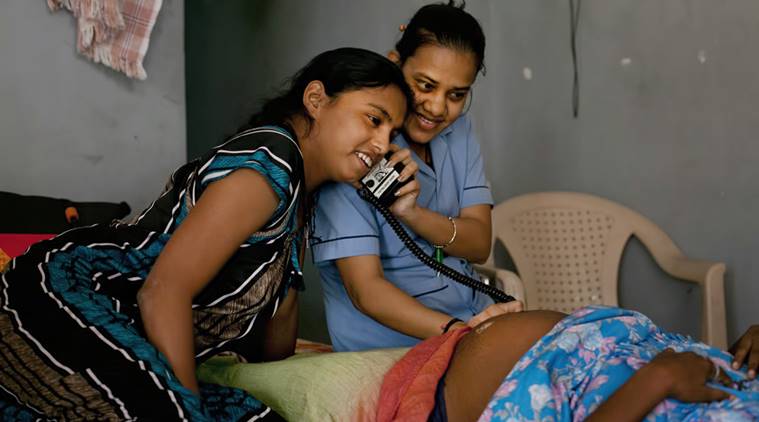
A nurse and a surrogate mother listen to a baby’s heartbeat in a dormitory run by Akanksha Clinic, one of the most organized clinics in the surrogacy business, in Anand, India.
Demographically, surrogate mothers usually come from the lower economic strata and for these women, a sum of $5000 – $8000 would make an unimaginable difference.
Anandhi, of the Indian city of Chennai, hoped to make a quick buck by volunteering to become a surrogate mother.
“I work as a domestic cook in a distant locality and stay away from my children for long hours. I decided to become a surrogate mother with a hope that the payment from the couple would help me start a shop near my house.” She delivered a healthy child, but her hopes bore little fruit for herself. She was promised $3306 but at the end received only $1653, with an auto-rickshaw driver who served as a middleman, taking a fifty-percent cut.
Women everyday are exploited in the name of surrogacy by the highly secretive and largely unregulated ‘baby factories’ dressed up very cleverly as legitimate IVF clinics. These clinics care less about the health and medical complications involved with the surrogate mother. The only thing that matters to them is the end product: the child.
Often medications like Lupron, oestrogen and progesterone are administered to help achieve the pregnancy, but they have serious side effects on the expecting mothers.
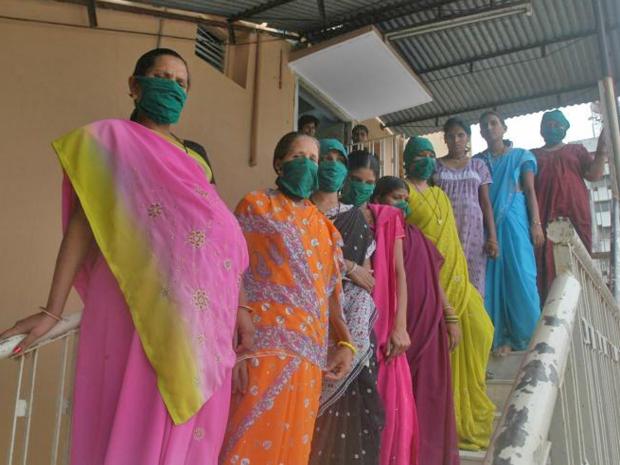
Surrogate Mothers in Ahmedabad, Gujarat, India
Premila Vaghela, a 30-year-old poor surrogate mother lost her life while reportedly waiting for a routine examination at a hospital in Ahmedabad, India. The news was barely covered by the media – after all, she had completed the task that she had been contracted for, and the eight-month-old foetus meant for an American “commissioning” parent survived.
In fact, Premila is like many other economically marginalized surrogates, who may suffer or even lose their lives while carrying a child, and are quickly forgotten. These women do not understand the value of life. The only value they understand is the value of money.
There are more that 50 million infertile couples in the world and some of them head to India and Thailand to rent wombs. It turned the two countries into the world’s biggest hubs for commercial surrogacy over just the past decade! What was once a mode of convenience, is now a booming $2.3 Billion commercial industry.
Thailand, however, banned commercial surrogacy for foreign couples after an Australian couple left a twin boy with his birth mother when it was discovered that he suffered from Down’s Syndrome. (The Baby Gammy Case)
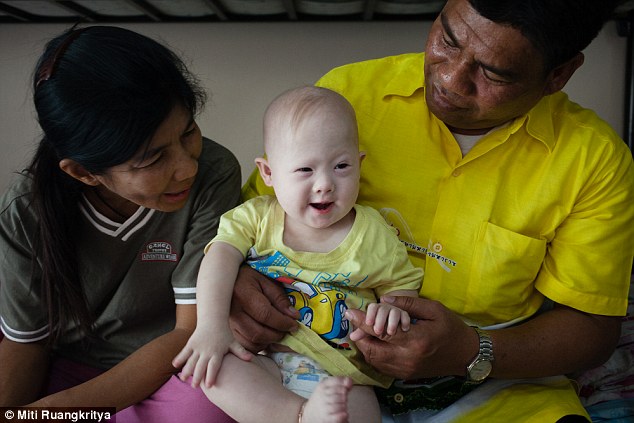
Baby Gammy: One of the twin born out of surrogacy, left behind by an Australian couple because he suffered from Down Syndrome, sits with his grandparents in Thailand, after laws were passed in Thailand preventing foreigners from using surrogacy to conceive a child.
Yet another case which puts the industry’s ugly under belly in the spot light, was when an another Australian couple went home in 2014 with just one of the twin born out of surrogacy, because they wanted a girl. Such cases not only question the ethics of surrogacy, but also highlight the extent of exploitation and misuse of the practice.
Despite of all of these cases, surrogacy is on the rise, not just in India and Thailand, but in the UK and in the United States as well, where some states allow commercial surrogacy and command the highest fees in the world. In addition, surrogacy has become the option of choice for gay couples, transgender people, and single men wanting a biogenetically related child.
Surrogacy: Human Right or Reproductive Exploitation?
In order to put an end to this rapidly growing industry we need to understand the reality of what surrogacy entails. Commercial surrogacy breeds exploitation, abuse and misery. Although the poster girl of surrogates is typically a white, blonde, smiling woman who is pregnant with the hopes of making a childless couple happy, the truth is far less palatable.
Women are often pimped by their husbands into renting their wombs to rich Western couples in greed for money. The reason behind the industry’s boom and success in India is the fact that foreign couples find it considerably cheaper than the rest of the world, with many couples admitting that it was reassuring that the surrogates in India are required to live in a clinic for the duration of the pregnancy so they can be easily monitored by the ‘brokers’ throughout.
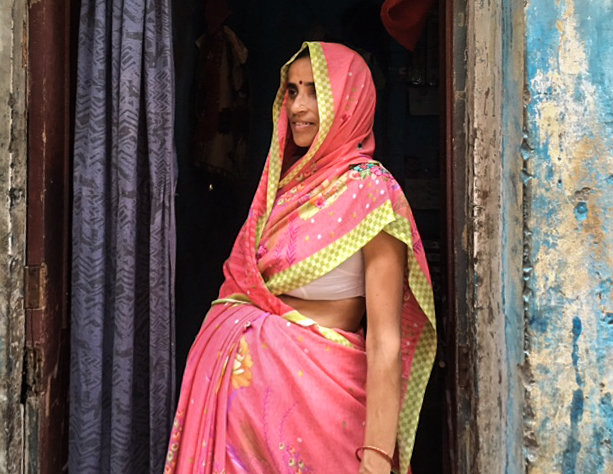
Isha Devi, 30, became a surrogate to help keep her family afloat. Her husband, a rickshaw driver, couldn’t work after an accident with a bus — and medical bills began mounting up.
Cost of surrogacy varies by the country in which it is achieved. A successful pregnancy in Thailand and India can cost up to $72,000, and up to $225,000 in the US, and absence of international regulation leaves surrogacy largely up to the brokers and vulnerable parties.
India has, however, initiated a bill in its parliament that claims to protect the interest of the surrogate mothers. According to this bill, surrogacy shall be allowed in altruistic form. Altruistic surrogacy is different from commercial surrogacy as it the process of bearing a child without the involvement of any monetary compensation; a surrogacy done out of good will.
The country shall allow altruistic surrogacy for Indian Nationals only, married for at least five years and medically certified as infertile. Also, only woman between the ages of 25-35 years of age, who are close relatives to the infertile couple, can act as surrogates. The bill excludes homosexuals and single parents from the procedure, considering it against the ‘Indian ethos’.
This bill, however fruitful it may sound, poses many limitations. It not only bans homosexuals from opting for surrogacy, but also makes it difficult for the heterosexual couples with medical indication for surrogacy. For a childless couple to have progeny is not a luxury, but a necessity. They’re the ones who’ll be affected most by the law.
Instead of regulating commercial surrogacy, doctors believe that this law is only going to drive the already booming industry underground, thus putting the rights and safety of surrogate mothers at risk and in the hands of the so called unscrupulous brokers.
The need of the hour is a law that provides a platform where the risks of things going wrong can be diminished, and where middlemen cannot ethically profit from the surrogacy arrangement.
However, in countries like India where babies are considered a blessing and requirements to start a family, and childlessness viewed as a stigma, it is but difficult to limit surrogacy. Furthermore, criminalization of it leaves anxious couples open to abuse by black markets.




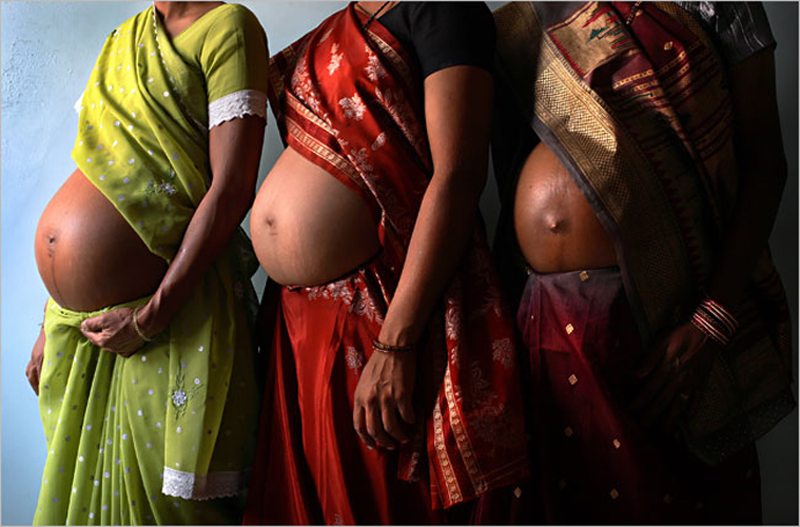

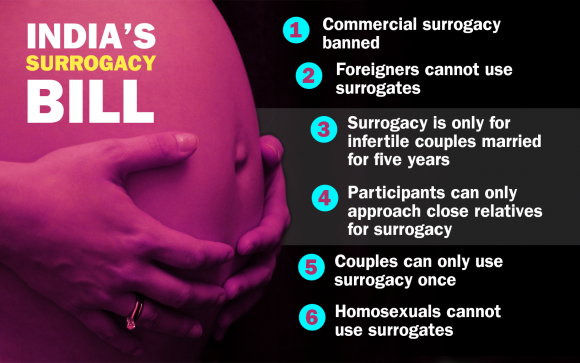



- Facebook Conversations -